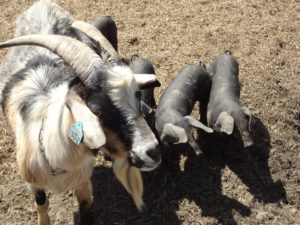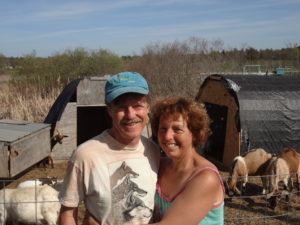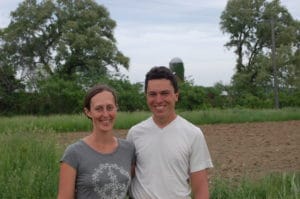Growing Pains and Profitability
Beginning farmer profit teams help farmers in New York State make critical decisions.
by Matthew Weiss
Farms at a Crossroads
Over the years we’ve learned that farmers can experience serious growing pains during the “adolescence” of their farm careers. Many new farmers persevere through the first few years of business on little more than blood, sweat, and tears; only to realize after all that hard work they are still not turning a profit and can’t go on pulling 80 hour work weeks forever. These farmers are at a crossroads, needing to scale up, improve efficiency, or make other major changes to achieve viability for their farm. Farmers at this stage in their careers are often faced with critical decisions that may determine the long-term success of the farm business. What farmers at this juncture need is decision making support from experts and mentors who have been down the same path and come out with profitable, sustainable models for success. The Small Farms Program saw a need and, working with New York Farm Viability’s Dairy Profit Team model, developed a pilot program for the Beginning Farmer Profit Team program.

According to Anu Rangarajan, Director of the Small Farm Program, “After farming for three to four years, we have found that most new farmers need to re-strategize their business to ensure growth and sustainability. The changes needed could be in production, marketing, labor or even financing. Trying to prioritize among the many different choices can be challenging to the new farmer.” Schuyler Gail from Climbing Tree Farm in New Lebanon, NY puts it in to perspective from the farmer’s point of view, “Due to a bunch of factors converging just before we were given this grant, we thought we would have to stop farming. Our experts have helped to show us that we have options and have given us the confidence and know-how to continue farming.” This is exactly the kind of scenario that the Beginning Farmer Profit Team program was created to address.
Overview of the Program
Any farm in New York State that has been in operation for 3-9 years and grossed at least $10,000 in sales in the previous season is eligible to apply for the program. So far two groups of 12 farms each have been accepted to the program through a competitive application process. Once accepted, the farms work with Small Farms Program and New York FarmNet staff to identify barriers to growth, overall goals, and potential advisors for their profit team. In some cases, the farms already know who they want to work with but if they don’t, we can help them find the right people to achieve their goals. Each farm gets up to $2,000 to hire the advisors on their profit team and pay them for their services. In order to ensure buy-in from the farms, they are required to make a 20% match, up to $400, out of pocket.

While improving farm profitability is one critical measure of the success of this project, other desired impacts include: improved management of farm natural and human resources; reduced stress of farm staff; and enhanced well-being of the farmer. We acknowledge that for many farmers, profit is only one benchmark of success and sometimes not even the most important one. Lifestyle, quality of life, and community engagement can be just as important to a beginning farmer. This aspect has come through in the experience of Climbing Tree Farm. According to Schuyler Gail, “this project has required a fair amount of soul searching and we’ve discovered that there really isn’t anything we would rather be doing than farming.”

Farm viability is at the core of the profit team program but we are also
very interested in helping the farms improve their farm management skills and become more confident as leaders, so that they can become more engaged in their communities and as mentors to younger farms. In order to do this, 2-day training retreats are held annually to address select farm business issues (prioritized by the farms), as well as management training, facilitation, and mentoring skills. This retreat type setting helps to create connections between the profit team farms and encourages comradery and farmer-to-farmer learning. In turn, it is our hope that the farms who have received the support of the project through Profit Teams will pay it forward and become mentors to other beginning farmers in their communities.
This pilot project will test the effectiveness of Beginning Farm Profit Teams to improve decision making of young farms facing challenges to growth and viability. If it proves effective our hope is that the program will be expanded. According to Anu Rangarajan, “We believe that the profit team approach of using consultants to support site specific planning and decision making is key. We are hopeful that this model, if successful in strengthening new farms in New York, will be made more broadly available.” In the meantime, if you are a New York State farmer who has been in business for 3-9 years and has grossed at least $10,000 in the last year, there will be one more round of applications accepted in February, 2016. If you are interested in applying for this last round of the program, please contact the author by email at mw84@cornell.edu.
Thanks to our funders.
The Beginning Farmer Profit Team Program is made possible by the USDA’s Beginning Farmer and Rancher Program and New York Farm Viability Institute.
Matt Weiss is the Beginning Farmer Project Coordinator for the Cornell Small Farm Program in Ithaca, NY. He can be reached at mw84@cornell.edu or 607-255-9911.

